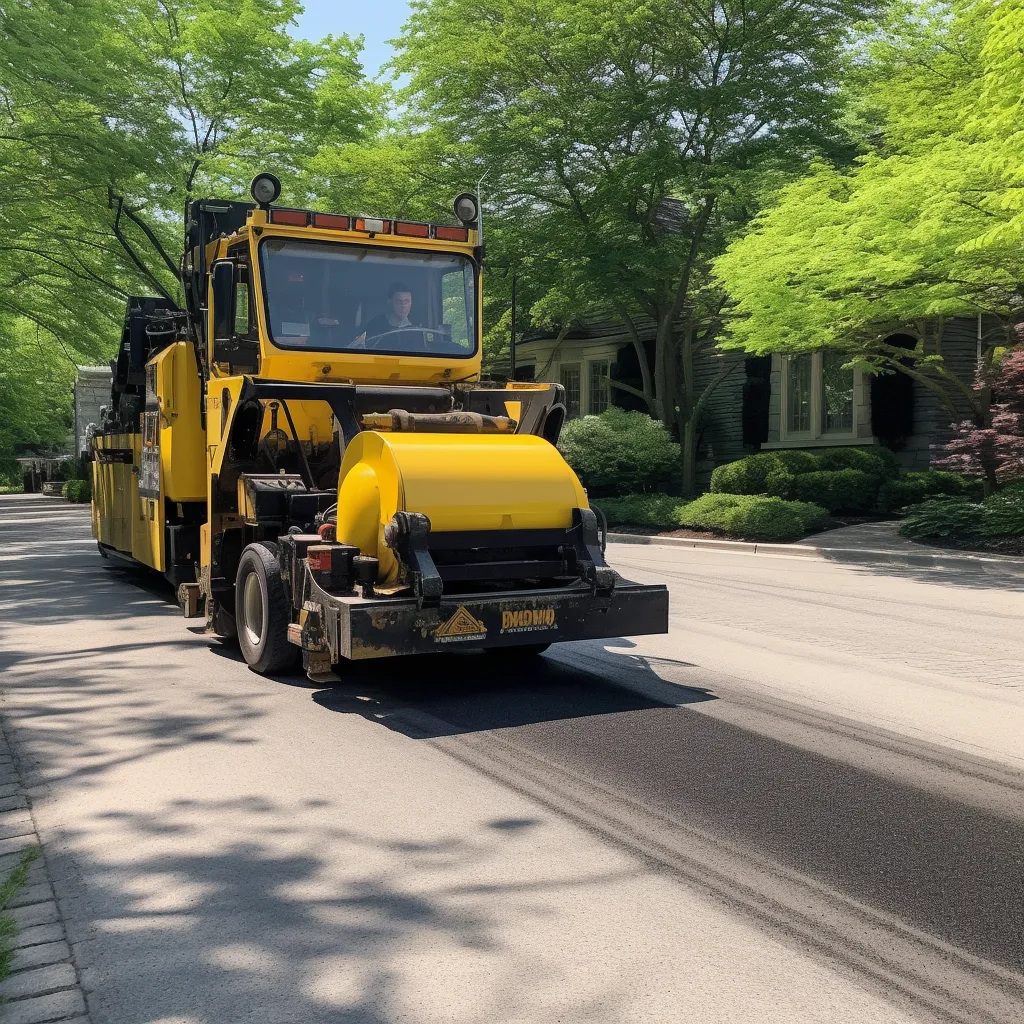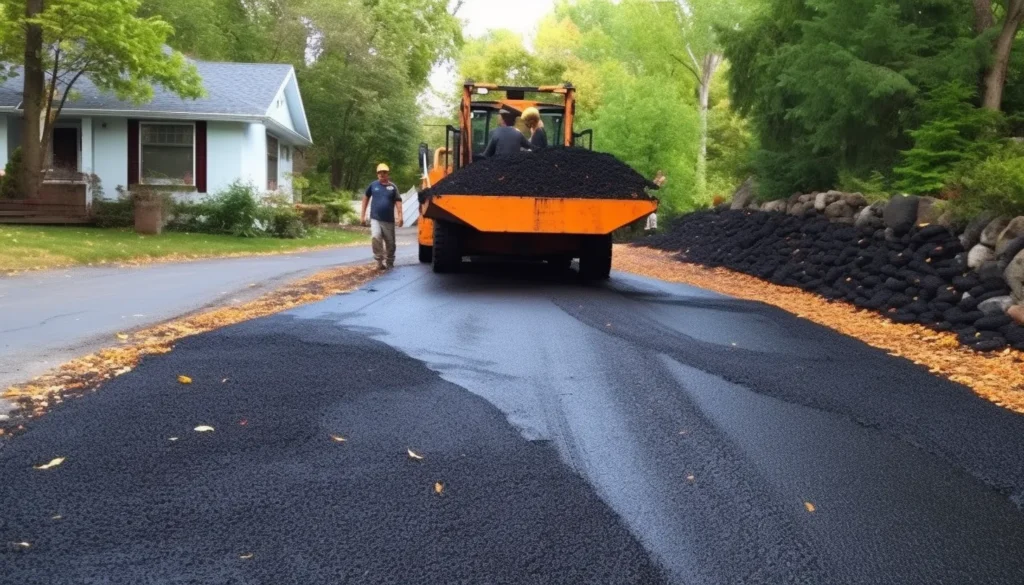As a homeowner, you want your driveway to be safe and durable for years to come. That’s why it’s important to understand the importance of asphalt thickness when considering a residential driveway.
Asphalt is the most common material used for driveways, and the thickness of the asphalt is critical for the longevity of the driveway. In this article, we’ll discuss the recommended asphalt thickness for residential driveways, factors to consider when measuring asphalt thickness, when to replace asphalt on a residential driveway, and the benefits of professional asphalt installation.
With the right knowledge and professional help, you can ensure your residential driveway is both safe and durable for years to come.
Why Asphalt Thickness Matters for Driveways

You want your driveway to be strong and durable, so it’s important to consider how thick you lay the material. Asphalt thickness is a key factor in ensuring your driveway can withstand the wear and tear of daily use.
The thicker the asphalt, the more resistant it will be to cracking, breaking, and deterioration. Asphalt thickness is also directly related to the lifespan of the driveway, as thinner asphalt will wear down quicker than thicker asphalt.
It’s important to select asphalt of the right thickness for your driveway to ensure it stands the test of time. Additionally, thicker asphalt is more resistant to inclement weather, as it can withstand heat during the summer and cold during the winter.
Furthermore, thicker asphalt is more able to handle the weight of vehicles and other objects, such as large furniture, which can cause cracking in thinner asphalt. Therefore, it’s important to consider the asphalt thickness when deciding on the material for your driveway.
Recommended Asphalt Thickness for Residential Driveways
No matter the size of your home, it’s essential to choose the right pavement thickness for your driveway to ensure safety and longevity. By employing alliteration to emphasize the importance of the decision, you can make the best choice for your home.
The recommended asphalt thickness for residential driveways typically ranges from two and a half to four inches. While some homes may require thicker asphalt, such as four and a half to six inches, most residential driveways are best served with the lower range of asphalt thickness.
The asphalt thickness is determined by a variety of factors, including the type of soil beneath the pavement, the amount of traffic, and the level of temperature variation experienced in the area. For instance, if you live in an area with extreme temperature variations, you’ll need thicker asphalt than if you live in an area with moderate temperatures.
Additionally, driveways that experience a lot of traffic should have thicker asphalt than those that don’t. Knowing the unique conditions of your residential driveway can help you determine the right thickness for your asphalt.
Factors to Consider When Measuring Asphalt Thickness
When selecting the ideal pavement for your home, it’s important to consider factors like the type of soil beneath the surface, the amount of traffic it’s exposed to, and the temperature extremes in the area.
Additionally, it’s important to consider the asphalt thickness when measuring the overall quality of your driveway. If you don’t select the correct thickness of asphalt, your driveway could be compromised and not last as long as it should.
The thickness of your asphalt should be determined by the type of soil beneath the pavement, the amount of traffic it’s exposed to, and the temperature extremes in the area. For instance, if the soil beneath the asphalt is sandy, it may require a thicker asphalt layer than if it was soil with more clay content.
The temperature extremes should also be taken into account as extreme temperatures can cause the asphalt to expand or contract, leading to cracks and other damage. Finally, the amount of traffic your driveway is exposed to should be considered when selecting the asphalt thickness, as heavier vehicles will require a thicker layer of asphalt to withstand the weight and wear and tear.
When to Replace Asphalt on a Residential Driveway
Replacing an old, worn-out driveway with fresh asphalt can revive a home’s curb appeal and provide a smooth, safe surface for vehicles and pedestrians alike. Deciding when to replace the asphalt on a residential driveway is critical to ensuring that it remains intact over time.
Generally, asphalt driveways should be replaced every ten to fifteen years. This is due to the fact that asphalt is a material that is naturally prone to wear and tear with regular use. Additionally, the amount of exposure to sun, rain, and snow can also contribute to the degradation of asphalt.
In order to determine if the driveway needs to be replaced, homeowners should look for signs of cracking, potholes, or a general lack of integrity in the asphalt. If these signs are present, it’s likely time to replace the asphalt. Professional assessment of the driveway can also help to determine if replacement is necessary.
Benefits of Professional Asphalt Installation

You can trust a professional to provide a smooth, durable surface that not only looks great but will last for years to come. When you hire a professional asphalt contractor, you can expect:
- Quality Materials and Installation: Professional asphalt contractors have access to high-quality materials and use the latest asphalt installation techniques. They’re also up-to-date on the latest safety regulations.
- Cost Savings: Professional asphalt contractors can ensure the job is done efficiently and properly. This can save you money in the long run, as you won’t have to repair or replace the asphalt as often.
- Long-Lasting Results: The asphalt that’s installed by a professional is designed to last for many years. It’ll be resistant to cracking, potholes, and other damages that can occur with DIY installations.
When you hire a professional asphalt contractor, you can rest assured knowing that your driveway will be both beautiful and durable for years to come. They’ll take the time to make sure that the job is done correctly and that you’re satisfied with the results.
Conclusion
You’ve learned the importance of asphalt thickness for residential driveways. A thick layer of asphalt offers maximum protection and a smoother ride. It can also prolong the life of your driveway.
When considering factors like climate, local regulations, and budget, you can choose the right asphalt thickness for your home. With professional installation, you can enjoy a smooth, durable driveway for years to come.
Imagine the feeling of joy from driving up to your home on a freshly paved driveway, knowing it’ll last you for years to come. You can make this dream a reality by investing in the appropriate asphalt thickness.



